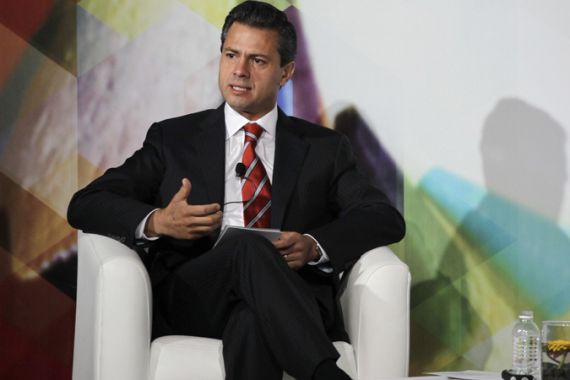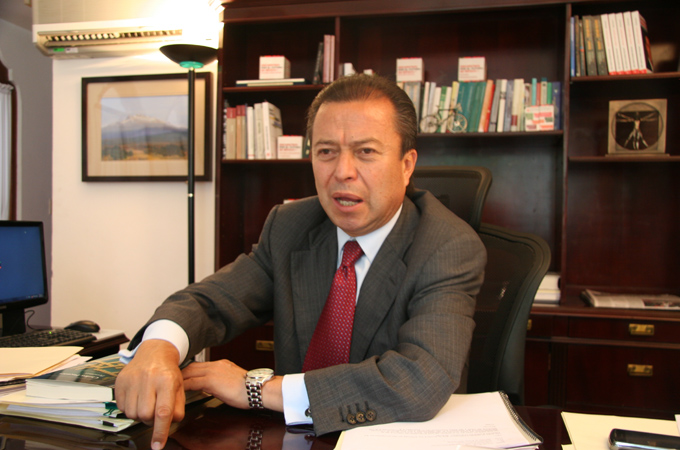A return of Mexico’s ‘perfect dictatorship’?
Once dominant party is poised for a comeback in upcoming elections, but critics say it would mean return of graft.

Mexico City – Selling newspapers from a small stand in Mexico’s capital, Alejandro Garcia doesn’t seem like a foot solider for a political dynasty. But he and thousands of other workers across this country want the Institutional Revolutionary Party (PRI) back in power and they’re ready to mobilise on behalf of what Peruvian writer Mario Vargas Llosa considered the “perfect dictatorship”.
“I think he [PRI presidential hopeful Enrique Pena Nieto] is the best candidate,” Garcia told Al Jazeera ahead of the country’s presidential and general elections. “The PRI are good leaders, things have gotten worse without them.”
Newspaper vendors like Garcia are members of the CTM (Confederation of Mexican Workers), a powerful trade union supporting the PRI. Men like him will be called out in force to vote on July 1 by the party that governed Mexico for 71 years.
During its heyday, the PRI employed a corporatist structure or “big tent” including farmers’ groups, national business associations, trade unions and basically anyone who wanted to be close to power.
‘We will go backwards’
Standing beside a monument to Mexico’s 1910-1919 revolution, government employee Manuel Villareal said he once worked under a PRI administration, and it wasn’t a pleasant experience. “We will go backwards with corruption and repression,” he told Al Jazeera. “They drew money from public sources to garner votes.”
Like some of their competitors from other political parties, several PRI politicians are under investigation for corruption. Tomas Yarrington, the former PRI governor of Tamaulipas state, for example, is facing civil charges in the US for allegedly receiving bribes from drug traffickers in the most recent high-profile corruption case.
But the old PRI, which some associate with corruption and nepotism, is no more: that’s according to Cesar Camacho, president of the Colosio foundation, a party-linked think-tank.
“We have been pushed by society to change… There has been a renewal of the PRI,” Camacho told Al Jazeera after hosting a press conference for the release of a hip looking policy document called “#LaCronica”, detailing ideas which a PRI government could use if elected.
He believes allegations of past corruption are overstated, a result of campaigns by the party’s political opponents.
A ‘new PRI’
Carlos Salinas De Gortari, Mexico’s PRI president from 1988-1994, is widely believed to have stolen large sums of public money from a slush fund controlled by the party. Carlos Enrique Cervantes de Gortari, his politically connected cousin, was sentenced to 15 years in prison by US authorities in 1993 for links to drug trafficking. Other members of Carlos Salinas’ entourage experienced a similar fate, although the former president flatly denies any links to gangsters or corruption.
 |
| Cesar Camacho, from a PRI-backed think-tank, believes the old ruling party “has been pushed to change” [Chris Arsenault/Al Jazeera] |
“When Salinas was president, Pena Nieto was 22 years old,” Camacho said. “Nieto will follow a different way of thinking and acting,” he said, adding that allegations against the former president are unfair and unproven. “We need a new way of doing politics, this country is absolutely different than it was in the 1980s.”
Rafael Morales Ramirez, professor of political science at the Autonomous University of Mexico City, agrees the PRI has changed – in degree, not in kind. After losing the presidency in 2000, its power became more diffused, he said, as it lost the ability to dole out favours at the national level.
“The old power of the PRI scattered across the country and ended up in the hands of state governors,” Ramirez told Al Jazeera. “They have absolute control over state politics, as they can mobilise support bases for their own political purposes and control their own succession.”
Democracy ‘with different characteristics’
Like many politicised Mexicans of his generation, Ramirez once worked for the PRI. He was an adviser to the failed 1999 presidential campaign of Francisco Labastida.
“I needed a job,” he laughs during an interview at “Mi Despacho”, a shady restaurant near the party’s headquarters, where overweight waitresses with short plaid skirts and low-cut tank tops sit on the laps of clients. The place is frequented by politicians, said one waitress who wouldn’t give her name.
For ages, if you wanted to be involved with politics, the PRI were the only game in town. Today, the professor has links to the left-leaning Party of the Democratic Revolution (PRD), which includes many former PRI members.
If Pena Nieto wins, Ramirez said, the old PRI style of “corruption, corporatism and political control will threaten democracy”.
PRI supporters including Camacho think that logic is absurd and such claims are linked to partisan campaigns against their party. “Democracy didn’t arrive in Mexico in 2000 [when the PRI was voted out of office],” Camacho, the think-tank analyst, said. “We have been [throughout the PRI era] a democratic country with different characteristics, depending on every moment in our history.”
Splits in the ‘big tent’
Formed in 1929 after a series of political crises, the PRI was designed to share power among competing factions and to institutionalise Mexico’s revolution – although critics believe the idea of an “institutional revolution” is a profound contradiction.
By creating one large camp, the party improved stability. It contained leftist and right-wing tendencies and has at times supported contradictory policies including the nationalisation of Mexico’s oil reserves in 1938 and a free trade deal with the US and Canada beginning in 1994.
After members of the party’s left wing split from the PRI to form the PRD in 1989, the “big tent” began unravelling and infighting within the PRI’s ranks worsened. In 1994, someone assassinated Luis Donaldo Colosio, the party’s presidential candidate, after whom the Colosio foundation is named.
“This party has more than 80 years on the political scene,” Camacho said. “As a kind of organism, it has passed through a lot of seasons.”
Visible symbols
| Mexico presidential hopeful rallies support |
Party platforms here are vague at best, and – like voters across the globe in the age of mass media – most of the electorate will cast their ballot based on which candidate seems the most personable and trustworthy, combined with where they stand on the traditional left-right political divide.
Today, PRI members give each other a special high-five symbolising the key branches of political power the party seeks to control: the presidency, congress, senate, state congresses (and governors) and municipalities (including local mayors).
“The PRI’s only problem now is that they don’t control the presidency,” Ramirez, the academic, said. “If they win, the party’s [dictatorial past] will rearticulate itself.”
If there is a visible symbol of the PRI, it’s the Tabacalera neighborhood in Mexico City, where the party’s central offices are located. The neighborhood was bustling, prosperous and politically connected during the PRI’s era of dominance. Back then, it was unclear where the Mexican state ended and the party began, according to critics.
Since the PRI’s defeat in 2000, the area has gone into decline, with rents dropping, prostitutes plying their trade on street corners and drunks stumbling around at mid-day.
‘Consensus’
For many working-class Mexicans, including newspaper salesman Alejandro Garcia, the PRI represents stability. And concerns about the erosion of democracy from academics like Ramirez are less important than bread-and-butter issues like crime and job creation.
Unlike the pro-business National Action Party (PAN) that rules Mexico today, the PRI’s political base comes from a cross-section of social classes. “The PAN are like a rotary club, they only know how to deal with people from the upper classes, people who are like themselves,” one government official told Al Jazeera on the condition of anonymity.
“The PRI has members who are peasants, people who grew up in rough areas, they know how to deal with angry workers and farmers because they have members who grew up in that background. They can build consensus.”
If the party can mobilise its old base of support from the unions, farmers and the national elite, then an election victory in July 1 seems likely. What happens after that is anyone’s guess.